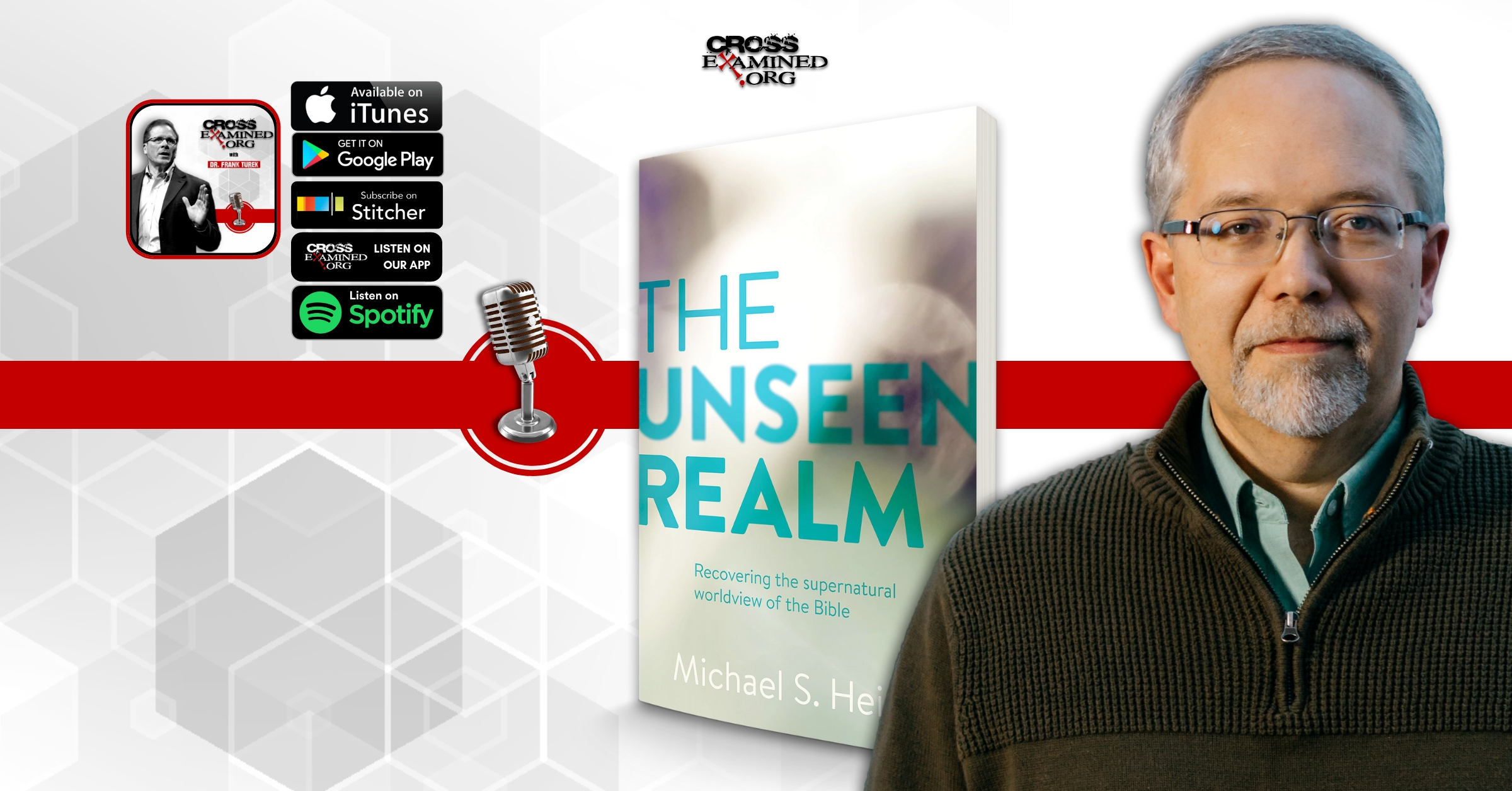Yes, Bart Ehrman, Jesus is Yahweh
Bart Ehrman is a professor of religious studies at UNC-Chapel Hill in North Carolina. He is well known for his best-selling popular-level books that are critical of the core tenets of evangelical Christianity and in particular the reliability of the New Testament sources. Frequent readers of my articles will already know that Ehrman is not the most careful scholar when it comes to his utilization of ancient sources. A few days ago, Ehrman published two blog posts (here and here) on his website, claiming that the idea that Jesus is Himself Yahweh is a recent doctrinal innovation, completely foreign to the New Testament and the ancient church. Ehrman even goes so far as to say that this is the view of only “some conservative evangelical Christians” and that “I’ve never even heard the claim (let alone a discussion of it) until very recently.” Furthermore, Ehrman adds,
I, frankly, had never even heard of such a thing until six years ago. Maybe I wasn’t listening in Sunday School, or maybe I was sleeping through those particular lectures at Moody Bible Institute; or maybe … Nah, I don’t think so. If someone knows differently, please let me know. But I can’t think of any ancient Christian source that talks about Jesus as Yahweh himself. Jesus is the son of Yahweh.
Ehrman asserts that,
The first time I heard someone authoritatively say that Jesus was Yahweh and that this was standard Christian teaching was in a debate I had with Justin Bass in 2015 – you can listen to it on Youtube. I can’t remember when in the debate he said it but he made some comment about Jesus being Yahweh, and I was floored. I thought: theologians have never called Jesus Yahweh!
For a scholar of Ehrman’s stature to be uninformed regarding Christian orthodox teaching on such a fundamental matter is absolutely astounding. In this article, I respond to Ehrman’s articles and show that he is profoundly mistaken about the teaching of the New Testament and the ancient church.
Early Christian Theologians
Ehrman wonders “if there are any early Christian theologians who have this view.” Yes, there are plenty. For example, Justin Martyr (~100-165), in his dialogue with Trypho the Jew, wrote[1],
…now you will permit me first to recount the prophecies, which I wish to do in order to prove that Christ is called both God and Lord of hosts…
I do not know how one can get much clearer than that. Irenaeus (~130-202) likewise states[2],
For I have shown from the Scriptures, that no one of the sons of Adam is as to everything, and absolutely, called God, or named Lord. But that He is Himself in His own right, beyond all men who ever lived, God, and Lord, and King Eternal, and the Incarnate Word, proclaimed by all the prophets, the apostles, and by the Spirit Himself, may be seen by all who have attained to even a small portion of the truth.
Ignatius of Antioch (~50-108) also affirmed Christ’s full deity. For example, in his epistle to the Ephesians, he wrote[3],
We have also as a Physician the Lord our God, Jesus the Christ, the only begotten Son and Word, before time began, but who afterwards became also man, of Mary the virgin.
I could continue to quote early church fathers for quite some time, but this should suffice to show that the view that Jesus is Yahweh, the eternal God, is not a new idea but rather goes back to the ancient church. I will now turn to Ehrman’s comments on the New Testament.
Is the Name Yahweh Found in the New Testament?
Ehrman states that,
Of course, the name Yahweh is not found in the NT at all, since it is a Hebrew word, and the NT is written in Greek. The NT does not give God a personal name.
This is obviously true since the New Testament was written in Greek, not in Hebrew. However, the New Testament does use an equivalent word — indeed, the word that is substituted for the Hebrew tetragrammaton YHWH in the Greek Septuagint translation of the Hebrew Bible. This word is κύριος, which is translated “Lord” in our English Bibles. Of course, it is true that this word had a broader range of meaning than simply denoting Yahweh (for example, Paul uses it of earthly masters — see Eph 6:5). However, the meaning of Greek words, as intended by the original author, can be shaved down through an examination of context. For example, Hebrews 1:10-12 quotes from Psalm 102:25-27:
You, Lord, laid the foundation of the earth in the beginning, and the heavens are the work of your hands; 11 they will perish, but you remain; they will all wear out like a garment, 12 like a robe you will roll them up, like a garment they will be changed. But you are the same, and your years will have no end.
Verse 10 uses the word κύριος, which evidently (given the fact that the author is quoting an Old Testament Psalm concerning the Lord God) is intended to denote Yahweh. What makes this text especially noteworthy for our purposes here is that the author of Hebrews applies the words of this Psalm to Jesus. Indeed, this Hebrew Biblical text is one of several applied to Jesus in Hebrews 1, as the author compares and contrasts the exaltation of the Son with that of the angelic beings.
To take another example, consider Paul’s quotation of Joel 2:32 in Romans 10:13: “For ‘everyone who calls on the name of the Lord will be saved.’” Again, this alludes to an Old Testament text that concerns Yahweh. But Paul introduces this text only a few verses after Paul declared that “if you confess with your mouth that Jesus is Lord and believe in your heart that God raised him from the dead, you will be saved” (Rom 10:9). The implication here is that the κύριος of verse 9 is the same referent as in verse 13 — namely, Jesus. In other words, Jesus is the Yahweh of Joel 2:32, on whose name we are to call. This point is drawn out even more explicitly by Paul in 1 Corinthians 1:2: “To the church of God that is in Corinth, to those sanctified in Christ Jesus, called to be saints together with all those who in every place call upon the name of our Lord Jesus Christ, both their Lord and ours.” This text again clearly alludes to Joel 2:32, except the Lord (κύριος) upon which we are to call is none other than Jesus Christ.
Another example is found in 1 Peter 2:2-4:
2 Like newborn infants, long for the pure spiritual milk, that by it you may grow up into salvation— 3 if indeed you have tasted that the Lord is good. 4 As you come to him, a living stone rejected by men but in the sight of God chosen and precious…
Verse 3 quotes from Psalm 34:8 (“Oh, taste and see that the LORD [Yahweh] is good!”). However, verse 4 identifies the κύριος of Psalm 34:8 as none other than Jesus Himself (the nearest antecedent of the pronoun “him” in verse 4 is “the Lord” from verse 3). This implies that Jesus is the Yahweh of Psalm 34:8.
Yet a further example can be found in 1 Peter 3:14-15:
14 But even if you should suffer for righteousness’ sake, you will be blessed. Have no fear of them, nor be troubled, 15 but in your hearts honor Christ the Lord as holy The Holy…
Admittedly, there exists some level of ambiguity about the original reading of verse 15, since the majority of later manuscripts read θεόν (“God”) instead of Χριστόν (“Christ”). However, Bruce Metzger notes that[4],
The reading Χριστόν, however, is strongly supported by early and diversified external evidence…as well as by transcriptional probability, the more familiar expression (κύριον τὸν θεόν) replacing the less usual expression (κύριον τὸν Χριστόν). The omission of τὸν Χριστόν in the patristic treatise de Promissionibus attributed to Quodvultdeus must be due to accidental oversight on the part of either translator or copyist.
If (as seems likely) the original reading is indeed “Christ the Lord”, then we have another example of an Old Testament text that concerns Yahweh being applied to Jesus. Compare 1 Peter 3:14-15, above, with Isaiah 8:12-13:
12 “Do not call conspiracy all that this people calls conspiracy, and do not fear what they fear, nor be in dread. 13 But the LORD of hosts, him you shall honor as holy.
Isaiah 8:12 is quoted by 1 Peter 3:14. Isaiah 8:13 is quoted by 1 Peter 3:15, except instead of calling his readers to honor the Lord of hosts as holy (as Isaiah did), Peter implores his readers to honor Christ the Lord as holy. Thus, we have yet another instance of the title κύριος (which is properly interpreted here as a substitute for the Hebrew tetragrammaton) being applied to Jesus.
I could continue in a similar vein for a considerable time. However, I trust that this is sufficient to dispel Ehrman’s contention that the New Testament does not use the name Yahweh and therefore never calls Jesus Yahweh.
Does Psalm 110 Preclude Jesus from Being Yahweh?
Ehrman continues,
When Christians wanted to find another divine being in the OT to identify as Christ, they went to passages like Psalm 110: “The LORD said to my Lord, sit at my right hand until I make your enemies your footstool.” Based on what I said in my previous post, you can reconstruct who is talking to whom here (notice the first LORD is in caps and the second not): “YHWH said to Adonai….”
Ehrman’s entire argument here implicitly presupposes Unitarianism. If the doctrine of the Trinity is true, then there is no problem with persons within the being or essence of Yahweh being distinguished from one another and even participating in conversation with each other. Nor is there a problem with the Father exalting the Son, since the Son had previously voluntarily humbled Himself through His incarnation and death on the cross. No Trinitarian is identifying the Son with the Father. Rather, the Father, Son and Holy Spirit are each distinctive persons who together totally share the essence of Yahweh, each possessing the divine attributes fully and completely.
Ehrman’s representation of the words used in Psalm 110:1 is not quite accurate, since it does not say that “YHWH said to Adonai…” but rather “YHWH said to Adoni.” This difference make look trivial (especially as these two words are distinguished only by a difference in Masoretic vowel pointing) but it is actually important. The title “Adonai” is exclusively used as a divine title (essentially as a synonym for YHWH). In fact, the ancient Hebrews would, instead of pronouncing the divine name, say “Adonai” instead. The word “Adoni”, by contrast, is simply the possessive form of the Hebrew word “Adon”, which means “Lord” or “Master” (the Hebrew equivalent of the Greek word κύριος). The word can be used of Yahweh, depending on the context, but it is not exclusively reserved for Yahweh. The upshot of this is that, though many Christians have used this text to argue for a plurality of divine persons (and, indeed, the deity of Christ), the reality is that any such argument based on this text is going to require more work and nuance than it often receives. I do not believe this text to be as conclusive as the previous texts discussed in the foregoing. However, it is, I would argue, certainly suggestive as we shall see. The context sheds some light on the intended referent of verse 1. In verse 5-7 of Psalm 110, we read,
The Lord is at your right hand; he will crush kings on the day of his wrath. He will judge the nations, heaping up the dead and crushing the rulers of the whole earth. He will drink from a brook along the way, and so he will lift his head high.
In the Hebrew, verse 5 does indeed identify the one seated at Yahweh’s right hand as none other than Adonai, a word used only ever of deity. Thus, Psalm 110 implies a plurality of divine persons within the Godhead. One possible reply to this is that Psalm 110:5 is merely the reversal of Psalm 110:1. Just as David’s Lord sits at the right hand of Yahweh, so also Yahweh is at the right hand of David’s Lord. For instance, in Psalm 109:31, Yahweh is at the right hand of the needy one, and in Psalm 16:8, Yahweh is at the right hand of the Psalmist David. The problem with this argument is that if one continues reading Psalm 110, it is clear that the “He’s” of verses 5-7 all refer back to Adonai, and in verse 7 this individual is said to drink from a brook — a human function. Thus, the individual seated at Yahweh’s right hand in Psalm 110 appears to be a divine-human person.
Furthermore, Jesus Himself Jesus makes the argument that “David himself calls him ‘Lord.’ How then can he be his son?” (Mk 12:37). The point Jesus is making is that none of David’s descendants could be greater than David. This, then, cannot be referring to an ordinary human descendent of David. The question is thus raised as to what sort of Lord this could possibly be referring to. But we can go even further than that. David’s Lord also cannot be any human king, since in Psalm 2:10-12 all kings are to be subject to David, and Psalm 89:26-27 tells us that,
I will appoint him [David] to be my firstborn, the most exalted of the kings of the earth.
It also cannot be a mere angelic creature since angels serve God’s elect and are servants themselves (c.f. Heb 1:7, 14; Rev 19:10 and 22:8-9). Who, then, is left? God.
The Angel of the Lord
Ehrman notes that Christians (such as Justin Martyr in the second century) have often identified the angel of Yahweh, in the Hebrew Bible, as a pre-incarnate manifestation of Christ. He writes,
I wonder if the confusion among some evangelicals about the Christian understanding of Christ (when they say he is Yahweh) is because the “Angel” of the LORD is so fully representative of YHWH himself that he is sometimes called YHWH after he is clearly identified NOT as YHWH but his angel. Why would he be called YHWH if he was YHWH’s messenger? It would be kind of like if a messenger of the king comes to you and orders you to do something, you tell your neighbors that the “king” has told you to do something. Well, actually, his messenger did, but he was so fully representative of the king that his words were the king’s.
This interpretation, however, fails to account for the fact that various people throughout the Hebrew Bible marvel at the fact that they have seen the angel of Yahweh and yet their lives have been spared (people aren’t supposed to be able to see Yahweh and live — Exodus 33:20). For example, consider the words of Jacob after having wrestled with a man in Genesis 32, one who is identified in Hosea 12:4 as the angel of Yahweh: “So Jacob called the name of the place Peniel, saying, ‘For I have seen God face to face, and yet my life has been delivered.’” Further support for the individual with whom Jacob wrestled being the angel of Yahweh comes from the parallel between Genesis 32:29 and Judges 13:18, in which the man and the angel of Yahweh respectively say, upon being asked for their name, “Why do you ask my name?”
Another occurrence of this is in Judges 6 where we read of Gideon’s encounter with the angel of Yahweh. In verses 22-24, we read,
22 Then Gideon perceived that he was the angel of the LORD. And Gideon said, “Alas, O LORD God! For now I have seen the angel of the Lord face to face.” 23 But the Lord said to him, “Peace be to you. Do not fear; you shall not die.” 24 Then Gideon built an altar there to the LORD and called it, The LORD Is Peace. To this day it still stands at Ophrah, which belongs to the Abiezrites.
Yet a further instance occurs in Judges 13, which records the appearance of the angel of Yahweh to Manoah and his wife to announce the birth of Samson. In verse 21-22, we read,
21 The angel of the Lord appeared no more to Manoah and to his wife. Then Manoah knew that he was the angel of the Lord. 22 And Manoah said to his wife, “We shall surely die, for we have seen God.”
Thus, we see that numerous texts (and there are plenty that I have not mentioned) bear witness to the deity of the angel of Yahweh. While Ehrman is correct to note that many of these texts also distinguish the angel of Yahweh from God, this is very consistent with a Trinitarian paradigm that views the messenger of God to be Yahweh and yet in another sense somehow distinct from Yahweh.
Ehrman’s interpretation of the angel of the Lord passages also fails to account for the parallelism observed in Genesis 48:15-16, in which we read of Jacob’s blessing of the sons of Joseph. He said,
15 “The God before whom my fathers Abraham and Isaac walked, the God who has been my shepherd all my life long to this day, 16 the angel who has redeemed me from all evil, may he bless the boys…”
Here, we see a poetic parallelism where the angel is identified as God. In fact, in the Hebrew, verse 16b uses the singular pronoun, “may he bless the boys”, implying that the angel and God are one and the same.
I discuss the subject of the angel of the Lord in much more detail here and here.
The Carmen Christi
Ehrman next turns his attention to the Christ poem in Philippians 2:5-11. He writes,
When Christ is exalted after his death, God gives him “the name that is above every name” so that all creation will worship and confess him. That is a reference to Isaiah 45 where Yahweh alone has the name above every name so that all worship and confess him alone.
Possibly these modern Christians are thinking that Christ, therefore, must have been given the name YHWH, and therefore he *is* YHWH. But the passage doesn’t seem to mean that. The ultimate LORD of all, YHWH, is the one who *gives* Jesus the name that is above all others. It’s worth noting that in this very passage, when God gives Jesus his “name,” it does not mean that he’s made a name switch for Jesus. On the contrary, the passage says that the name to which everyone will bow in worship and confess is *Jesus*! (Not YHWH): “That at the name of Jesus every knee shall bow, and every tongue confess.” Jesus’ own name is exalted.
This, however, is not the argument at all. I do not interpret the “name” of verse 9 to be a personal name. Rather, this in my opinion is best understood as referring to Christ’s reputation that He received as a consequence of His humiliation and death upon the cross.
There are at least three mutually supporting arguments for Christ’s deity that may be adduced from this text. First, this text is chiefly concerned with Christ’s humility, since “though he was in the form of God, did not count equality with God a thing to be grasped” (Phil 2:6). This only makes sense if Christ is equal in status to God, since one is not commended for humility for not exalting oneself to a higher status than one had a right to. If I refrain from overthrowing the monarchy and exalting myself as king, I am not due praise for my humility in so restraining myself. The text, then, is best understood if Christ voluntarily laid aside the divine privilege that was rightfully His. This reading is also supported by the Greek. Indeed, the construction is known as a double accusative of object-complement. Daniel Wallace explains that[5],
An object-complement double accusative is a construction in which one accusative substantive is the direct object of the verb and the other accusative (either noun, adjective, participle, or infinitive) complements the object in that it predicates something about it.
In this case, the verb is οὐχ ἡγήσατο (“did not count”), the direct object is τὸ εἶναι ἴσα θεῷ (“equality with God”) and the object complement is ἁρπαγμὸν (“a thing to be grasped”). Thus, the relationship between the direct object and the object complement is rather like an equal’s sign. In other words, Jesus did not count equality with God to be a thing to be grasped (ἁρπαγμὸν). Furthermore, Roy Hoover has argued that this is in fact an idiomatic expression, which “refers to something already present and at one’s disposal. The question… [is] whether or not one chooses to exploit something.”[6] Hoover observes that in every instance where this noun ἁρπαγμός is the object compliment in a construction such as this (where the verb is one of regarding or seeing or consideration), it always means something like an exploitable advantage. Thus, argues Hoover, one could reasonably translate this text to be saying that Christ did not regard being equal with God as something to take advantage of.
A second consideration is that Paul uses the Greek word μορφῇ in verse 6 to describe Christ being in the form of God and uses this exact same word in verse 7 to describe Christ taking the form of a servant. This implies that Christ was in the form of God in the same sense as He took upon Himself the form of a servant. Since Christ was very literally a servant, “being born in the likeness of men” (v. 7b), it follows that Christ was also literally God.
Third, Ehrman rightly points out that verses 10-11 allude to Isaiah 45:23, in which we read, “To me [that is, Yahweh] every knee shall bow, every tongue shall swear allegiance.” However, in the context of Philippians 2:10-11, every knee is bowing and every tongue swearing allegiance to Jesus. Indeed, that is what is meant by confessing that Jesus Christ is Lord (κύριος), which literally means master.
Conclusion
To conclude, contrary to Ehrman’s assertions, the view that Jesus is Yahweh has been the orthodox Christian position for nearly two millennia, and it is taught in the New Testament. Ehrman claims that the name Yahweh is never used in the New Testament and so could not be applied by the New Testament authors to Jesus. However, the New Testament does use the equivalent Greek term κύριος. Although this word is also used to describe earthly masters, the word is often used to denote Yahweh when the New Testament quotes the Old Testament, and often these texts are explicitly applied to the person of Jesus. Ehrman’s argument from the New Testament’s usage of Psalm 110 presupposes a Unitarian paradigm. Though Ehrman argues that the angel of the Lord in the Hebrew Bible is only the agent of Yahweh who is invested with divine authority, this argument collapses on the basis of the various exclamations of surprise, following an encounter with the angel of the Lord, that one has survived despite having seen God face-to-face. Finally, Ehrman is mistaken about Philippians 2:5-11, which is best read as indicating that Christ voluntarily laid aside the divine privilege that was rightfully His in order to take upon Himself the form of a servant.
Footnotes
[1] Justin Martyr, “Dialogue of Justin with Trypho, a Jew,” in The Apostolic Fathers with Justin Martyr and Irenaeus, ed. Alexander Roberts, James Donaldson, and A. Cleveland Coxe, vol. 1, The Ante-Nicene Fathers (Buffalo, NY: Christian Literature Company, 1885), 212.
[2] Irenaeus of Lyons, “Irenæus against Heresies,” in The Apostolic Fathers with Justin Martyr and Irenaeus, ed. Alexander Roberts, James Donaldson, and A. Cleveland Coxe, vol. 1, The Ante-Nicene Fathers (Buffalo, NY: Christian Literature Company, 1885), 449.
[3] Ignatius of Antioch, “The Epistle of Ignatius to the Ephesians,” in The Apostolic Fathers with Justin Martyr and Irenaeus, ed. Alexander Roberts, James Donaldson, and A. Cleveland Coxe, vol. 1, The Ante-Nicene Fathers (Buffalo, NY: Christian Literature Company, 1885), 52–200.
[4] Bruce Manning Metzger, United Bible Societies, A Textual Commentary on the Greek New Testament, Second Edition a Companion Volume to the United Bible Societies’ Greek New Testament (4th Rev. Ed.) (London; New York: United Bible Societies, 1994), 621–622.
[5] Daniel B. Wallace, Greek Grammar beyond the Basics: An Exegetical Syntax of the New Testament (Grand Rapids, MI: Zondervan, 1996), 182.
[6] Roy W. Hoover, “The Harpagmos Enigma,” Harvard Theological Review 64 (1971).
Recommended resources related to the topic:
How Can Jesus Be the Only Way? (mp4 Download) by Frank Turek
Cold Case Resurrection Set by J. Warner Wallace (books)
Jesus, You and the Essentials of Christianity – Episode 14 Video DOWNLOAD by Frank Turek (DVD)
__________________________________________________________________________________________________________________________________________________
Dr. Jonathan McLatchie is a Christian writer, international speaker, and debater. He holds a Bachelor’s degree (with Honors) in forensic biology, a Masters’s (M.Res) degree in evolutionary biology, a second Master’s degree in medical and molecular bioscience, and a Ph.D. in evolutionary biology. Currently, he is an assistant professor of biology at Sattler College in Boston, Massachusetts. Dr. McLatchie is a contributor to various apologetics websites and is the founder of the Apologetics Academy (Apologetics-Academy.org), a ministry that seeks to equip and train Christians to persuasively defend the faith through regular online webinars, as well as assist Christians who are wrestling with doubts. Dr. McLatchie has participated in more than thirty moderated debates around the world with representatives of atheism, Islam, and other alternative worldview perspectives. He has spoken internationally in Europe, North America, and South Africa promoting an intelligent, reflective, and evidence-based Christian faith.
Original Blog Source: https://cutt.ly/vbGeYgn











